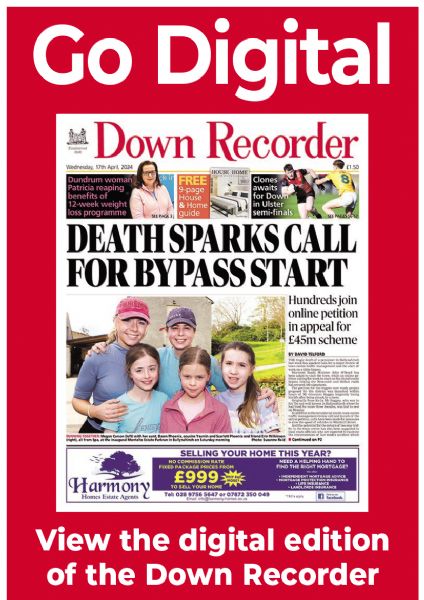Concern as quarter of Covid-19 deaths linked to those with dementia
Concern as quarter of Covid-19 deaths linked to those with dementia
25 November 2020
THE high toll of Covid-19 on people living with dementia was highlighted at a Newry, Mourne and Down Council meeting last week.
Mournes councillor Leeanne McEvoy raised the stark fact that recent figures showed that over a quarter (27.5%) of those who died from Covid-19 were living with dementia.
As chairwoman of the council’s Active and Healthy Communities committee, Cllr McEvoy stressed the dementia was the common underlying health condition associated with deaths from the virus.
Supported by Crotlieve councillor Gerry O’Hare, she introduced a notice of motion to hold a virtual Dementia Friendly Workshop to help staff “better relate to, support and communicate with people with dementia to help tackle stigma, establish best practice and reduce barriers for our ageing population within our council area.”
Cllr McEvoy, who works with older people as a domiciliary locality manager, called on the members to welcome the Minister for Health’s stated commitment to reforming Adult Social Care and his department carrying out an inquiry into the provision of respite care and carers assessments for people affected by dementia. This will include allowing loved ones of care home residents to be given key worker status.
She described the recent figures as “alarming” and stressed: “People affected by dementia have been worst hit by the coronavirus pandemic – facing devastation at home, in their community and in care homes.
“The effects of the outbreak cannot be undone, but urgent action can be taken to better protect people ahead of the winter, and in the future. To make this happen, we need government to address the reality of lockdown for people affected by dementia.
“From the high death rate in care homes, to the significant cognitive decline for those who live in the community, to the rising mental health challenges for unpaid carers, the pandemic has had a severe impact, while exposing our fragmented social care system for all to see.”
She said that the Alzheimer’s Society’s new report shone a light on the impact of coronavirus on people who have dementia and those who care for them including — the severe effects of social isolation on people who survived the crisis; regular health and social care services were put on hold, a backlog of people missed out on essential support; an extra 92 million hours were spent caring for loved ones with dementia — due to the lockdown making dementia symptoms worse as well as the “chronically underfunded social care system” which left those caring with nowhere to turn.
Ninety five per cent of carers who participated in the survey stated that it had negatively impacted them both physically and mentally.
Cllr McEvoy said that since her motion was mentioned at the last full council meeting, she had been contacted by numerous families thanking her for raising the issue of Dementia awareness.
She added: “I am asking that we write to the Health Minister welcoming his commitment to reforming Adult Social Care and urge his department to heed Alzheimer’s Society ‘The Fog of Support ‘ – to ensure those living with dementia are better protected now and into the future, allowing loved ones of care home residents to be given key worker status.”
Her motion received cross party support with Cllr O’Hare encouraging everyone to visit the Dementia Bus when it next visited their area.
Cllr Hugh Gallagher said that designating loved ones of people in care homes as key workers was very important.
Cllr Billy Walker thanked Cllr McEvoy for bringing the motion forward. “When you see loved ones living with dementia not being allowed to visit, it’s heartbreaking,” he said. “Our party welcomes and fully supports it.”
He suggested the council write out to DEA co-ordinators to make them aware of the Dementia Bus and plan for future visits.
Cllr Barra Ó Muirí thanked Cllr McEvoy from bringing forward the motion and stressed that the reform of social care for those living with dementia was important.
The motion is to go before the full council meeting before it is formally adopted.

